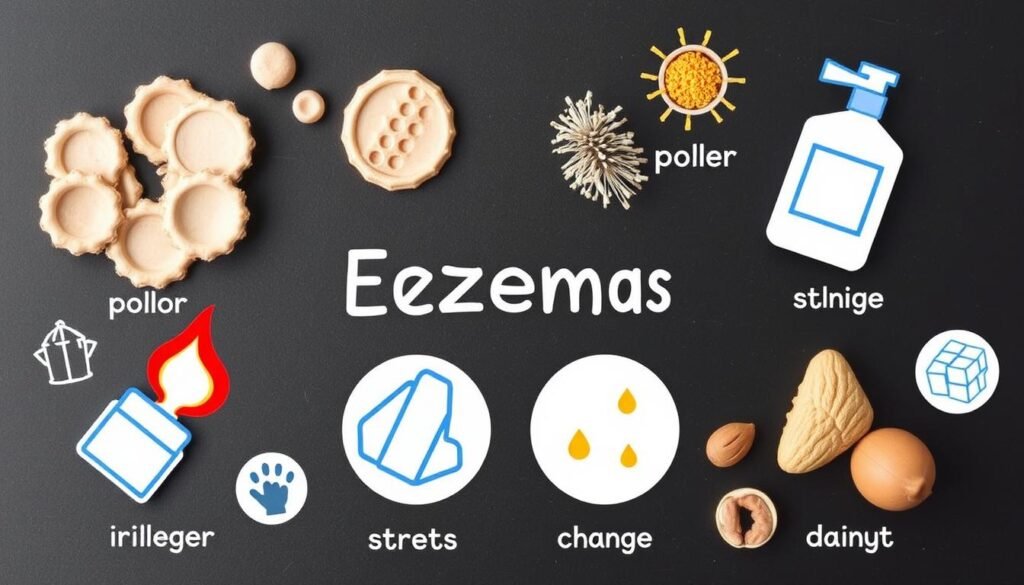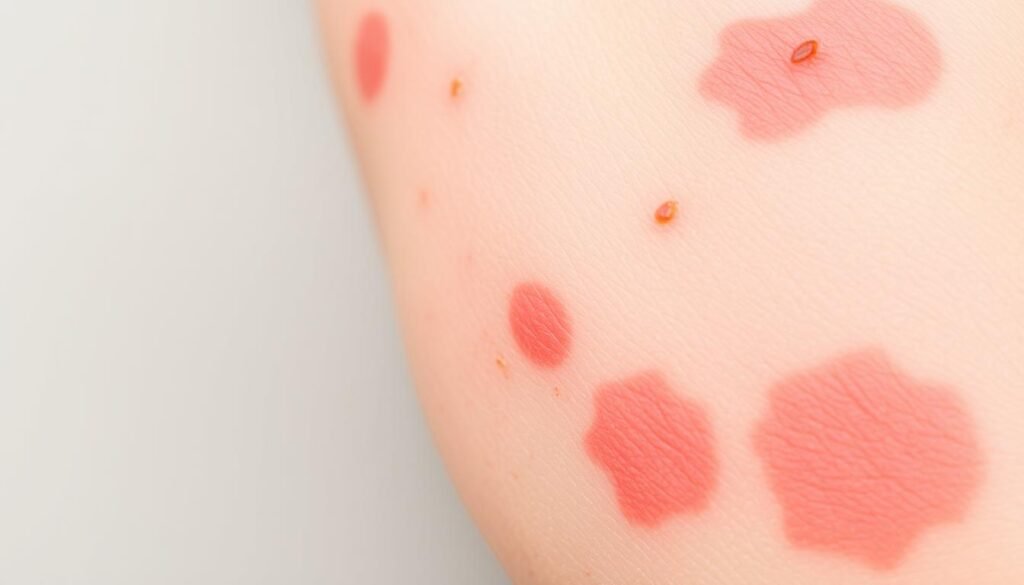Did you know eczema affects 10% to 20% of kids and 1% to 3% of adults in the U.S.? This condition, also called atopic dermatitis, can look different on everyone. Because it’s so common, it’s crucial to spot the signs early. If you have itchy and dry skin, you might have eczema. These symptoms can lead to more trouble if not treated. Spotting skin rashes early lets people manage their eczema better. To learn more about symptoms and treatments, see the Mayo Clinic’s guide to atopic dermatitis.
Key Takeaways
- Eczema affects a significant portion of the population, making awareness essential.
- Recognizing itchy skin as a primary symptom can lead to earlier management.
- Dry skin patches often signal the need for further examination.
- Skin rashes from eczema vary in appearance and severity.
- Early identification can prevent worsening symptoms and complications.
- Understanding age-related symptoms is crucial for effective treatment.
Understanding Eczema: An Overview
Eczema is also known as Atopic Dermatitis. It’s a complex skin issue seen in people of all ages. It causes dry, red, and very itchy skin. Knowing more about this condition helps in dealing with it better.
The immune system plays a big role in eczema. Things like the environment, allergens, and genes also contribute. These factors make the skin inflamed, showing how the body reacts to threats with skin problems.
Changing your lifestyle can help ease eczema symptoms. Knowing what triggers your eczema is key. Doing things like keeping your skin moisturized, staying away from stuff that irritates it, and eating well helps strengthen your skin. This knowledge gives people the power to manage their eczema more effectively.
| Aspect | Description |
|---|---|
| Common Symptoms | Redness, dryness, inflammation, and itching |
| Age of Onset | Any age; often begins in early childhood |
| Trigger Factors | Allergens, stress, weather changes, irritants |
| Management Strategies | Moisturizing, medication, lifestyle adjustments |
Common Symptoms of Eczema
Knowing the common symptoms of eczema is key to handling this condition. It’s important to monitor signs that appear during flare-ups. The severity of these signs can change.
Here are the main symptoms to look for:
Itchy Skin as a Key Indicator
Itchy skin is a major sign of eczema. The urge to scratch can be very strong. This can make the skin even more irritated and cause complications.
The itch usually starts before other symptoms show up. This leads people to look for ways to ease the discomfort.
Identifying Dry Skin Patches
People with eczema often get dry skin patches. These areas might feel rough or scaly because they’re not moist enough. Over time, these patches can hurt, peel, or bleed, making eczema harder to deal with.
Recognizing Inflamed Skin Responses
Inflamed skin means a serious flare-up of eczema. You might see redness and swelling, showing that the skin is seriously reacting. This inflammation can feel very uncomfortable. If it gets worse, you might need to see a doctor.
| Symptom | Description | Potential Impact |
|---|---|---|
| Itchy Skin | Intense urge to scratch | Can worsen irritation and lead to open wounds |
| Dry Skin Patches | Rough, scaly areas often lacking moisture | May cause peeling or bleeding |
| Inflamed Skin | Redness and swelling in affected areas | Indicates severity and may require treatment |
Recognizing Eczema Symptoms
It’s crucial to identify eczema symptoms early. Doing so helps manage the condition before it gets worse. Different age groups show different symptoms, making it important for everyone to be aware. This way, you can act fast and seek the right treatment.
The Importance of Early Identification
Spotting eczema symptoms early is key to stopping the itch and irritation. Pay attention to any skin changes. This helps you get treatment early and prevent the condition from getting worse. Being aware of skin changes is a big step in managing eczema effectively. It helps improve your life.
Symptoms Across Different Age Groups
How eczema looks can change a lot depending on your age. Babies might have flaky patches on their ears and scalp, similar to cradle cap. As kids get older, the irritation can spread and turn into dry, itchy rashes. Teens and adults might see their eczema become a long-term problem, with lots of dryness and red, inflamed skin.
| Age Group | Common Symptoms |
|---|---|
| Infants | Cradle cap, red and scaly patches |
| Children | Itchy rashes, scaly skin |
| Teens and Adults | Chronic dryness, redness, inflammation |
Take note of any skin changes to better understand and handle eczema. For more details on this condition, check out this resource.
Triggers That May Worsen Eczema
A variety of Eczema Triggers affect our skin’s health and how bad symptoms get. Knowing these triggers helps a lot in controlling them. Some usual ones are:
- Allergens like pollen, pet dander, and dust mites.
- Irritants such as soaps, detergents, and certain fabrics.
- Weather changes, especially extreme cold or heat, and humidity.
- Stress and changes in emotions.
By spotting and dealing with these Factors that Worsen Eczema, people can really cut down on outbreaks. Staying mindful of what’s around you helps a lot in avoiding these triggers.

How Skin Rashes Evolve with Eczema
Understanding eczema’s skin rashes is key to effective treatment. These rashes range from mild redness to severe outbreaks. Knowing the stages helps manage the condition well.
Stages of Eczema Rashes
Eczema rashes go through distinct stages:
- Initial Redness: Starts as red patches on the skin.
- Itchiness: Skin gets dry and very itchy, leading to scratching.
- Inflammation: Scratching makes the skin inflamed and swollen.
- Blistering: Severe cases can cause blisters that may ooze or crust.
Distinguishing Between Eczema and Other Skin Conditions
It’s vital to tell eczema apart from other skin issues for correct treatment. Psoriasis shows up as thick scales, whereas contact dermatitis affects only irritant-exposed areas. This knowledge is crucial for accurate diagnosis and treatment choices.
To learn more about managing symptoms and understanding eczema, check out this resource.
Factors Contributing to Eczema Flare-Ups
Various factors can cause eczema flare-ups in daily life. Knowing these can help manage symptoms better. This may even reduce how severe they are.
Hormonal changes can make eczema worse. This is true during menstrual cycles, pregnancy, or menopause. Stress also has a big impact, leading to more outbreaks.

Environment plays a big role too. Seasonal allergies or new skincare products can trigger eczema. Being aware of your surroundings is key. Plus, sticking to a skincare routine helps a lot.
Lifestyle matters as well. Not sleeping enough can harm your immune system and worsen eczema. Eating foods that fight inflammation helps your skin. Exercise improves your mood and reduces stress, which can help.
It’s crucial to know what triggers your eczema. Being proactive about managing these factors is important. For more info, check this resource for help and advice on treatment and lifestyle changes.
| Contributing Factor | Impact on Eczema Flare-Ups |
|---|---|
| Hormonal Changes | Can aggravate symptoms during menstruation or pregnancy |
| Stress Levels | Triggers skin irritation and flare-ups |
| Environmental Factors | Exposure to allergens or irritants leads to outbreaks |
| Lifestyle Choices | Poor diet or inadequate sleep negatively affects skin health |
Strategies for Skin Condition Management
Managing skin conditions like eczema is very important. Using moisturizing techniques can make a big difference in skin health. It helps keep the skin moist and protects it from things that can irritate it. Learning the right ways to care for your skin can lessen eczema flares and keep your skin balanced.
Moisturizing Techniques
To keep skin moist, use a moisturizer regularly. It’s important to moisturize right after you bathe to lock in water. Use products made for eczema. These might have ceramides, glycerin, or hyaluronic acid. Creams or ointments are better than lotions. They provide a thicker barrier.
- Choose fragrance-free products to minimize irritation.
- Consider using ointments for more severe dryness.
- Reapply moisturizers several times a day, especially after handwashing.
Topical Treatments Available
Along with moisturizing, topical treatments are key for skin condition management. Medicines like corticosteroids reduce inflammation and itching. There are also non-steroidal options, like calcineurin inhibitors, that help without steroid side effects. For more advice on treating eczema, check this resource on eczema management.
Talking to a doctor can help you find the right mix of moisturizing techniques and medicines. This can lead to better skin health and improve your life.
When to Seek a Dermatologist Consultation
Understanding when to seek help is key in managing eczema. Some issues might need a Dermatologist Consultation. Recognizing these signs can lead to better treatment and prevention.
Signs Indicating Professional Help is Needed
There are clear signs it’s time to see a dermatologist. These include constant flare-ups, intense itching, and skin irritation that standard remedies don’t fix. Signs of infection like oozing, crusting, or increasing redness also mean it’s time to get professional advice. Knowing these indicators helps in deciding when to look for help.
What to Expect During a Dermatology Visit
Seeing a dermatologist means getting a full skin check. They will look at your symptoms and might ask about what triggers them, your family’s skin history, and what treatments you have tried. They might do skin tests or cultures to check for infections.
Treatment options will be talked about, including creams, meds, or lifestyle changes to help you.
| Symptoms | Recommended Action |
|---|---|
| Severe Itching | Consult a dermatologist |
| Persistent Flare-Ups | Schedule a Dermatologist Consultation |
| Signs of Infection (oozing, crusting) | Immediate medical attention |
| Ineffectiveness of Home Treatments | Consult a dermatologist for alternative solutions |

The Role of Lifestyle in Eczema Management
Lifestyle choices play a critical role in effective eczema management. Adopting healthy skin practices can minimize flare-ups. This improves your skin’s condition. Simple changes in daily routines can bring big results.
For instance, a balanced diet rich in omega-3 fatty acids and antioxidants boosts the skin. Eating salmon, walnuts, and leafy greens helps nourish the body.
Managing stress is vital in controlling eczema symptoms. Practices like yoga or meditation help reduce inflammation. They also promote emotional well-being. It’s important to avoid triggers like certain fabrics and temperature changes.
Healthy Skin Practices take a holistic approach, focusing on both mental and physical health. Use moisturizing products that are free from irritating chemicals. This helps improve your skin’s barrier and lessen itchiness and discomfort. Regular visits to a dermatologist are crucial for advice on skin care products.
| Lifestyle Factor | Impact on Eczema |
|---|---|
| Diet | Supports skin health and reduces flare-ups |
| Stress Management | Decreases inflammation and promotes skin healing |
| Moisturizing Routine | Enhances skin barrier and alleviates dryness |
| Trigger Avoidance | Minimizes the likelihood of flare-ups |
| Professional Guidance | Ensures appropriate treatment and product use |
Making informed choices leads to healthier skin for many. By focusing on lifestyle changes, one can see a significant difference in eczema management. More insights are available at this resource.
Conclusion
Knowing how to spot eczema signs is key to taking care of your skin. Spotting common signs like itchy, dry areas and swelling helps people act early. This early action can make life better by picking the right treatments and care early on.
Also, knowing what triggers your eczema is crucial. By understanding what affects your skin, like the environment, food, or stress, you can keep symptoms in check. Regular skin care, using the right skin creams, and talking to doctors are all important steps for managing eczema.
In sum, dealing with eczema is a chance to learn more about taking care of your skin. Making smart choices and noticing eczema signs early helps manage skin care well. Putting in the effort to know about eczema leads to skin that’s both healthier and happier.